What's for dinner? Islanders from different backgrounds share their favourite holiday meals
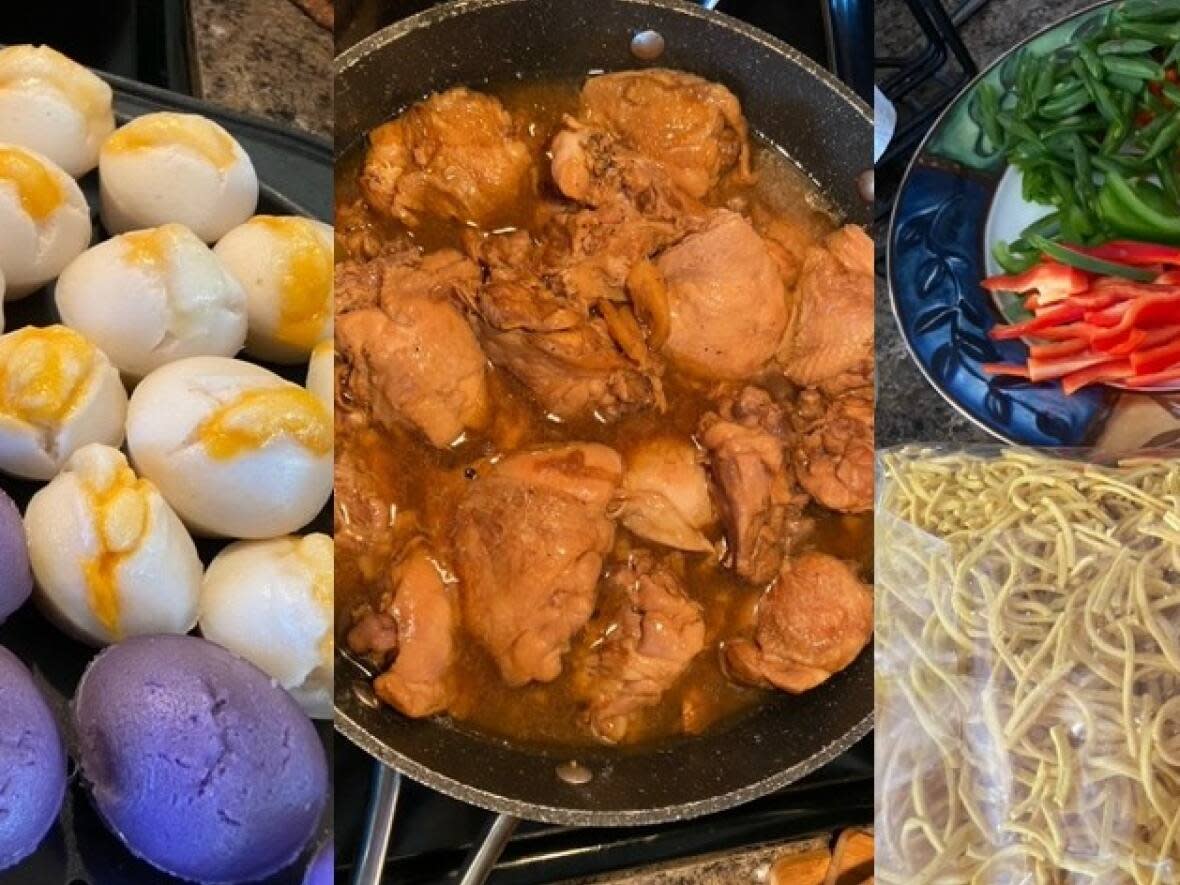
The turkey may still be there. But with COVID-19 raging, family dinners are just not the same this holiday season.
With gathering restrictions tightening, Islanders will be forced to keep their celebrations limited mostly to their own households.
But for some newcomers, the holidays being different than what they used to be isn't anything new.
As COVID-19 once again changes how people celebrate, some are reflecting on what festivities looked like where they grew up.
And yes, they're thinking about the food, too.
Here's what their holiday dinners looked like back then, and how they look now in P.E.I.
Sherilyn Manantan
Sherilyn Manantan moved to Canada from the Philippines over a decade ago. But she's making sure to keep connected to her roots.
"We usually talk to my family in the Philippines the morning of Dec. 25 because they're 12 hours ahead, right? So it's our morning and it's their ... Christmas night," she said.
Holiday celebrations in the Philippines start as soon as Sept. 1 hits. During Christmas week, there's gift exchanges and fireworks, but Manantan said everything revolves around being with family.
"We used to have, like, a singalong karaoke," she said. "My cousins, they have their own band. So we set up in our yard and then we sing until morning."
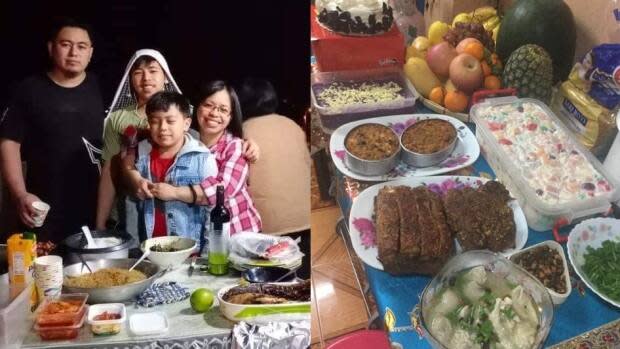
Of course, there's lots of food. The pièce de résistance is lechon, roasted pork that is served during all kinds of special occasions in the Philippines.
There's also pancit, a stir-fry noodle dish with seafood characterized by its orange hue.
"We believe it gives you a long life," she said.
As for dessert, her family made puto bumbong, purple-coloured rice cakes made from steamed glutinous rice and topped with coconut.
Manantan said she can't decide which dish is her favourite.
"We usually had that sticky rice ... the pancit," she said. "Not the lechon, because we couldn't afford it. But we had sisig [pig ears].
"We had menudo, adobo and all meats."
Now that she has her own family, including a five-year-old son, Manantan has established some new traditions, such as going out to see the Christmas lights and attending the Santa parades.
For Christmas, she still tries to cook some of Christmas staples of her childhood. She said in the last couple of years, it's become increasingly easier to find some of the necessary ingredients.
Of course, everyone is a critic.
"[My son], he's so picky. He doesn't really care about food," she said. "He just likes the chicken skin. So that's it. As long as you give him that, he's happy."
Tatiana Mizerina
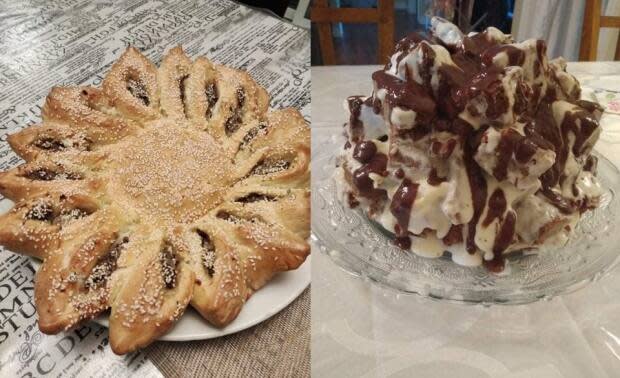
Tatiana Mizerina came with her family from Russia in 2014.
Christmas for people in the Orthodox faith is Jan. 7. But when Mizerina moved to P.E.I., she began celebrating it on Dec. 25, as well.
Former Soviet Union policies on religion made it so Christmas wasn't widely celebrated in Russia for most of the 20th century. Instead, the secular celebration of New Year's became the most important winter holiday for most Russian families.
"New Year is a kind of national celebration and Christmas is mostly like religious celebration for Christian families, while in Canada, it's kind of a national celebration for everyone," she said.
Growing up, goose, duck and fish were the equivalents to Christmas turkey.
"My family personally prefers goose," she said.
Some Russian New Year dishes include salads such as the olivier or Russian salad and what's known as "herring under a fur coat" — a layered dish made of pickled herring, boiled eggs, potatoes, beets and other vegetables.
Champagne and caviar are also staples. Mizerina said sturgeon is best, but that it's really hard to find.
For the holidays, Mizerina usually makes Russian-style pies, dumplings and cake.
Usually, she'd be celebrating with other members of the Island's Orthodox community. But with COVID-19, she said Christmas this year will be small.
Leslee Sack

Leslee Sack is a proud New Yorker from Brooklyn who's been living on the Island since the early 2000s.
While her family still lives in the U.S., Sack said it didn't take long before she was welcomed by what she calls her "Island family," many of whom are members of P.E.I.'s Jewish community.
For Hanukkah, the community usually hosts a potluck. Sack said people usually bring their A game to the feast.
"There's some very fantastic cooks in the community," she said. "A lot of baking, a lot of cooking, a lot of everything."
Sack also loves cooking, something she said runs in the family. Her grandfather was a baker who bequeathed many recipes to his children, including one for twisted bagels, a Jewish holiday staple.
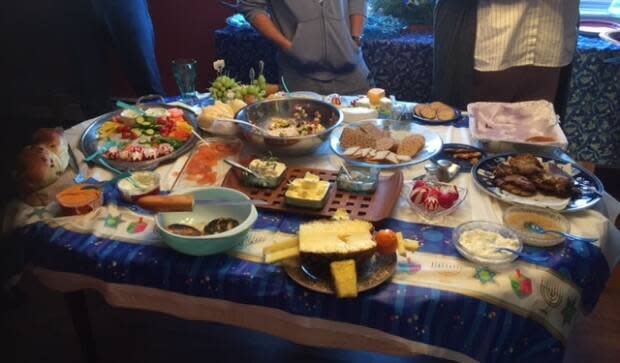
"I don't eat wheat anymore so I can't eat them," Sack said. "I bring along my gluten-free ones. Not the same as my grandfather's."
Latkes, the Jewish potato pancake, is the chief traditional Hanukkah dish.
"I make mine Canadian latkes and add cheese to my potato. I just use egg, and the egg clusters it together so I don't need any wheat," she said.
Sack said most traditional Jewish holiday dishes have lots of oil, so people in the potluck usually bring salads and other healthy dishes to balance things out.
Her grandkids usually visit during the summertime as opposed to Hanukkah, so they don't get to eat some of her holiday recipes. But if they did, Sack suspects they would like them.
"They'll eat anything I make," she said.
Rosette Bobo
Rosette Bobo was born in the Congo, but she lived in Kenya before coming to P.E.I. with her family 10 years ago.
Growing up as a Catholic, Bobo's Christmas revolved around the church.
"We can go, start church at around 9 p.m. until 5 a.m.," she said. "People will take food there, some snacks, little snacks. And they will sing, they will dance, praising the Lord until 5 a.m."

Bobo said most families made sure to have a goat.
"Everything inside the belly, they will make into soup," she said. "Then the meat, they can just put it maybe in the oven or whatever, or barbecue."
The goat stew is accompanied by rice and vegetables. Bobo's family likes to make pondu, a staple Congolese dish made out of cassava leaves.
"But the big thing is to kill the goat," she said.
Bobo said for the first few years she was in P.E.I., Christmas felt very different.
"Maybe third Christmas I started to know some people, so we started spending time together ... My birthday is in December, too, so I'll push it maybe to celebrate with [a] friend on the 24th," she said. "[But] most Christmases, I spent Christmas crying."
In 2018, her family went to Moncton, N.B., and got a goat for Christmas dinner. But most years, Bobo usually sticks to pork ribs and chicken.
"I'm tired with turkey," she said.
And while it's not the same, Bobo still attends the Christmas Eve and New Year's Eve church service.
Neusiane Silliker
Neusiane Silliker met Islander Craig Silliker in Brazil. The couple married almost a decade ago and eventually settled on the Island.
Silliker said Christmas means a lot to her and that she greatly misses spending time with her family in her home country.
Silliker hasn't spent a Christmas in Brazil since she moved to P.E.I. This is the seventh holiday season she's spending in the province.
But she said while being here isn't the same, she's able to remain connected to her family and roots through cooking.
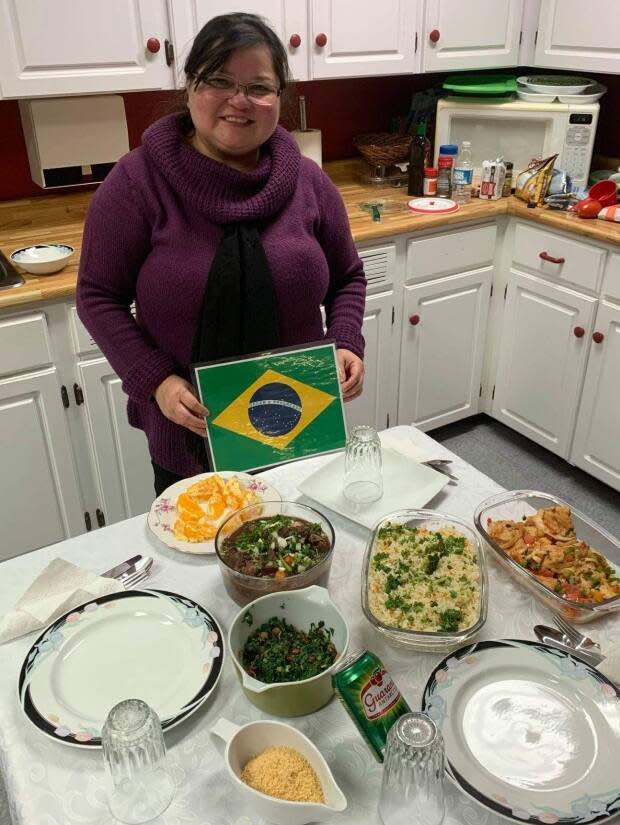
Roasted turkey is the No. 1 Christmas dinner dish in Brazil. It's usually served with rice and farofa, which is a toasted cassava flour mixture.
Ham, cod, potato salad and lentils are also foods "you can't miss" during the holidays, she said.
But Silliker especially likes to make desserts.
"In this time, I like to cook in Brazil sweets, cakes," she said.
For New Year's, she plans to make bacalhau, Brazilian salted cod.
Silliker has become sort of an ambassador for Brazilian cuisine in the Island. For past holidays, she's been trying to mix some of that country's dishes with more traditional Canadian fare.
"I cook for my family in Canada. [They said], 'Wow, it's very good,'" Silliker said. "Different cultures, you know? Celebrating."


